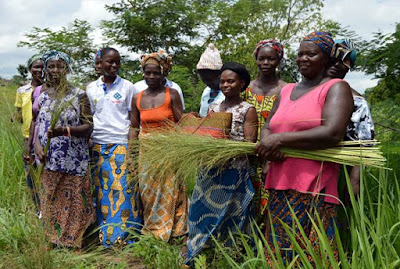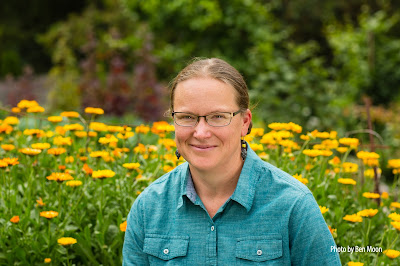I am happy to inform you we have returned from a four week trip to Togo. While I realize the importance of our presence in the United States, I must admit I miss my family and all of Alaffia’s people in Togo deeply, and it was heartbreaking to say goodbye. Like all my trips to Togo, this one also strengthened the conviction we had 12 years ago to empower our Togolese communities.
However, unlike previous trips, this time we were able to participate in all parts of the Alaffia chain, from shea nut collecting to visits with community support recipients. The needs of our time in Togo were so great, we were not able to go to Ghana or Benin as originally planned. Below are the highlights of our trip.
First, though, I would like to pass along the “thank you” that our Alaffia cooperative members have asked me to express to all of you in the United States that support Alaffia. They wish all of you and your families good health (Alaffia!).
Alaffia Village
Our first objective was to spend time with our main cooperative in Sokodé known as “Village Alaffia.” It brought me great joy to spend time with our diverse members, from such different ethnic backgrounds and religions. While the Village is a workplace, it is full of positive spirit and energy. For many of our women, it is their second home, and they are keeping it beautiful and happy with flowers and smiles.
 |
| Shea nuts drying at Alaffia Village, Sokodé, July 2015 |
 |
| Alaffia Village Shea Butter Cooperative members say goodbye to Alaffia founders, Sokodé, July 2015 |
Alaffia Collectives
A great deal of our time was spent visiting and meeting with Alaffia’s women’s collectives that supply our various ingredients, including shea nuts, moringa, grass (baskets), and baobab. The collectives are comprised of women organized on a village level to sell agricultural good, such as shea nuts, together. Alaffia has contracts with the collectives and each collective member to establish pricing and quantities as part of our commitment to 100% transparency and traceability. To truly realize the impact Alaffia is forging in our communities, we have to be in direct contact with our collectives. Not only are they the first link of the Alaffia chain, but they are often the poorest and in the most remote villages. The visits with our collectives are important in other ways; they enable us to personally ensure Alaffia is treating the women in the collectives in the fairest manner possible. We share with collective members Alaffia’s activities in the United States, where their products end up on the shelves, and the many challenges we face in the United States. Today we are fortunate to work with over 4,000 women in our shea nut, grass, baobab and neem collectives.
 |
| Alaffia Blitta Central Grass Collective with Alaffia Collective Trainer and Supervisor, Egbaré Kéméalo (in Alaffia shirt), July 2015 |
Alaffia Women’s Health Training Center, Bassar, North Central Togo
Moreover, we participated in the inauguration of Alaffia’s new Women’s Health Training Center in Bassar. We completed the construction of the center earlier this year, but it officially opened just now. While it is not a medical center, it is extremely important to have a central training center in Bassar. For the past four years, Alaffia has had an office in Bassar to provide maternal health support to women survivors of female genital mutilation (FGM). However, last year, we realized that to best benefit the communities and to meet our objective of eradicating FGM in this part of Togo, the most effective approach is to prevent FGM from occurring in the first place, and this can only be done through training and education. The training center was necessary to give us a place to inform the Alaffia community health agents so they can distribute the vital information to their communities. I am deeply grateful to all of you, as it is the sales of Alaffia that paid for the construction of this community center.
 |
| Alaffia’s Women Health Training Center with Community Health Agents and Alaffia Community leaders, Bassar, July 2015 |
On the same day the center was inaugurated, we also participated in the distribution of 60 bicycles to Alaffia’s community health agents. Because most communities in Togo do not have highly trained health officials or hospitals, the government provides “Agents de Santé”, individuals trained in first aid, but with little or no formal educations. These individuals are volunteers, and act as emergency first aid providers for villages without a clinic. In exchange for alerting Alaffia of FGM activities in their village and participating in FGM eradication trainings, Alaffia provided each health agent with a bicycle. The bikes will also serve as emergency transportation for very ill people to the nearest health clinic. While you may think a bike offers so little, in these communities in Bassar, the transportation they provide can make the difference between life and death. Alaffia also provides each health agent with cell phone minutes so they can alert Alaffia if one of our maternal health recipients has a health emergency. The Bassar Health Training Center and maternal Health Program are run by Alaffia’s maternal health coordinator, Abide Awesso and her assistant, Hèzouwè Takougnadi.
Alaffia School and Good Soap Kindergarten Construction Updates
We also took two days of our busy schedule to visit the Good Soap funded kindergarten we built this year in Kaboli and to choose the site for the 2016 Good Soap Kindergarten. Last year, with the launch of the Good Soap program, we pledged to build a kindergarten each year with proceeds from the sales. We are happy to report that the Kaboli Good Soap Kindergarten is being used and enjoyed by 60 young boys and girls, and we have now begun breaking ground for a new kindergarten in Adjengré. We chose Adjengré because of the great need for a building. Currently, the 200 kindergarten students share space with older grades in a makeshift building. In May 2016, the Alaffia Good Soap kindergarten will be completed and these young children will finally have their own space to grow and learn. In additional to choosing a kindergarten site, we also chose Essovalé as the site for the 2016 Alaffia middle school construction.
 |
| Kaboli Kindergarten students and teachers, Kaboli, June 2015 |
 | |
|
Alaffia Artisan Center
Finally, the greatest part of our time was taken by the conversion of our previous cooperative location in Sokodé to the Alaffia Artisan Center. While we call it the Artisan Center, in reality it is a rehabilitation center for prostitutes, who while they have sewing skills, have found themselves in prostitution because of the lack of jobs and life circumstances beyond their control. The Center provides rehabilitation in the sense that we hope the stable income and well-respected environment will mean that these women will never again have to sell their bodies and souls to provide for themselves and their families. We started with a small team of 12 young ladies, three who make the batik prints and nine who sew the Queen Alaffia bags and scarves. For me personally, establishing this center for all that Alaffia strives for touches me deep in my heart. These ladies who I had never met before, along with the Alaffia Community Project Team and cooperative members worked long hours to set up the sewing machines, establish dye colors and patterns, and set quality control standards. Within two weeks, we began producing bags.
While each of these women has gone through the impossible, the brief accounts following the images are a window into the lives of two of the Alaffia artisans. I promised these women that upon my return to the US I would continue to do all that my living body could do to sell their beautiful bags and not to let them down. I also told them they would always be a part of Alaffia and even if Queen Alaffia does not take off, there is a place for them at the Alaffia Shea Butter Cooperative. However, we will forge onward with Queen Alaffia and grow it so it can serve its humanistic objectives of rehabilitating these women in our communities. The Artisan Center is a new chapter for Alaffia, but one that I believe will restore basic human rights and bring equality to our women.
 |
| Alaffia artisans Chérifa (in front) and Kafui (at machine), June 2015 |
 |
| Alaffia batik patterns are all original and unique, June 2015 |
Alaffia Artisan Chérifa: Chérifa reached freshman level of high school, at which point she left school to join a seamstress apprentice program in Notse, a town in south Togo. Her father paid approximately $50 for the program, and she passed her seamstress evaluation with above average marks in 2010. She is the oldest of her mother’s six children. Her mother is still alive but is very old, and her father has passed away. Chérifa resorted to prostitution when her family situation became difficult. Her father passed away, she was unable to find work as a seamstress, and her husband got another woman pregnant and asked her to leave his home. Chérifa has been a prostitute for a year and a half. She has tried to stop several times, but her situation has always forced her to return. Now that she has joined Alaffia, she has made her final decision and is very relieved she will no longer have to work as a prostitute.
Alaffia Artisan Kafui: Kafui dropped out of school after 7th grade, and joined a seamstress apprentice program eight years later. Both her parents are now dead, and of her eight siblings, she is one of only two who are still alive. She was able to open a shop after finishing her apprentice program, but was the victim of several break-ins and thefts. Her remaining brother refused to help her, and this was when she resorted to prostitution to support herself. She has been a prostitute for three years, but it is involuntary, she does it only to support herself and her two children. Kafui has had a difficult life. Most of her family is no longer alive, she got pregnant with her first child after being raped when she was just a teenager. However, she works hard to better her life, she is not only a seamstress, but has also trained herself to make jewelry and crochet. Joining Alaffia has given her a way out of prostitution, and she will never go back.
 |
| Queen Alaffia artisans express their gratitude and joy in joining the Alaffia family, July 2015 |
With all my heart, I thank you for the role each and every one of you play in enabling Alaffia to make true and everlasting positive impacts in my communities. This recap makes it clear that the positive effects we see in our communities would not be possible without your participation in retailing Alaffia’s products. You bring about a true everlasting empowerment, which is not possible through handouts. I wish you all a peaceful summer.
Gratefully Yours,
Olowo-n’djo




